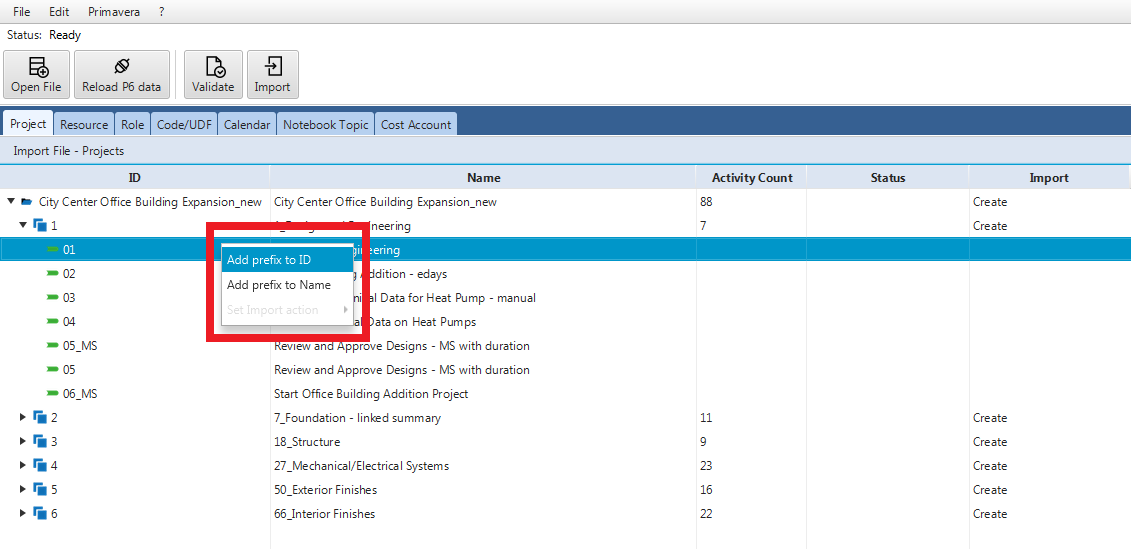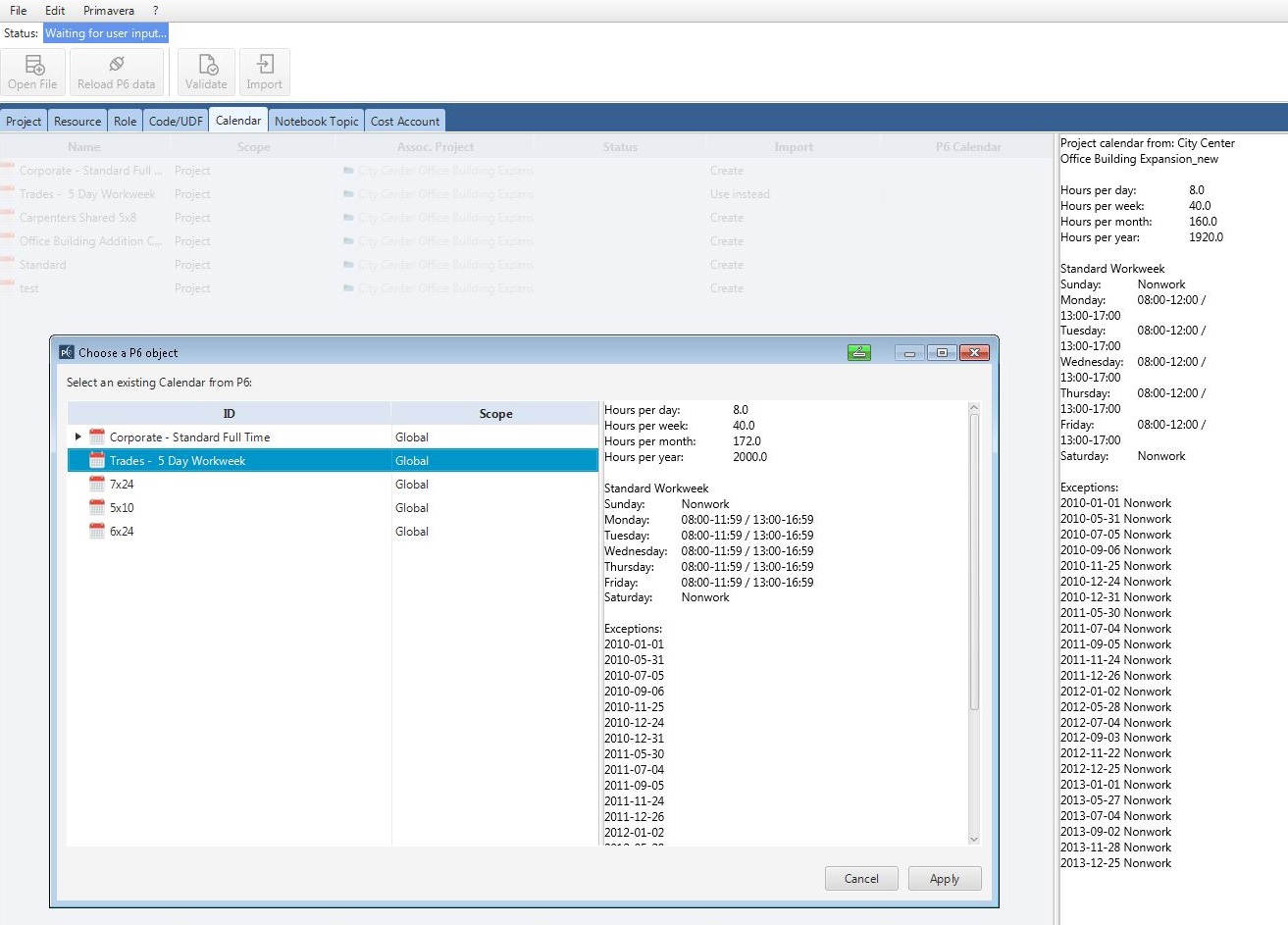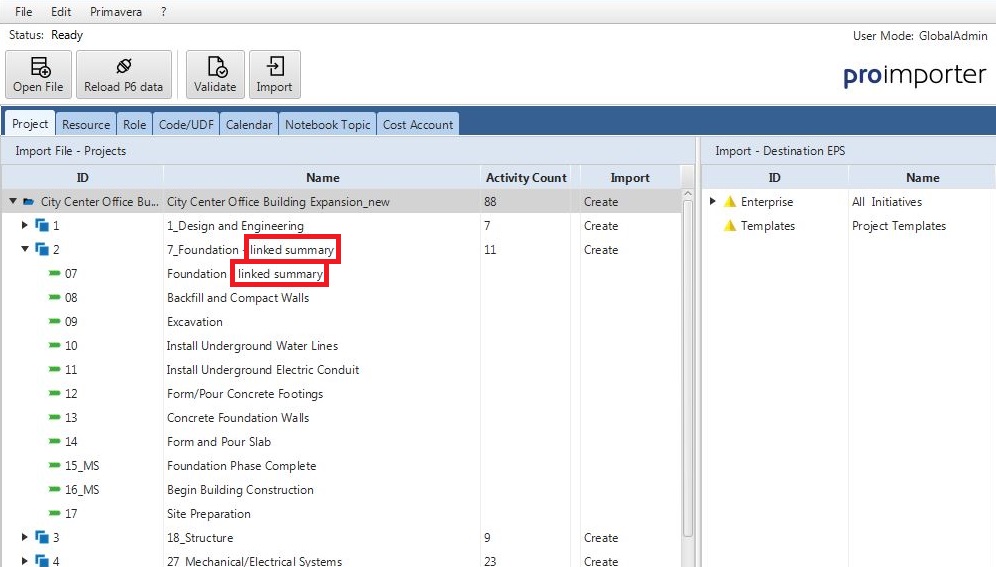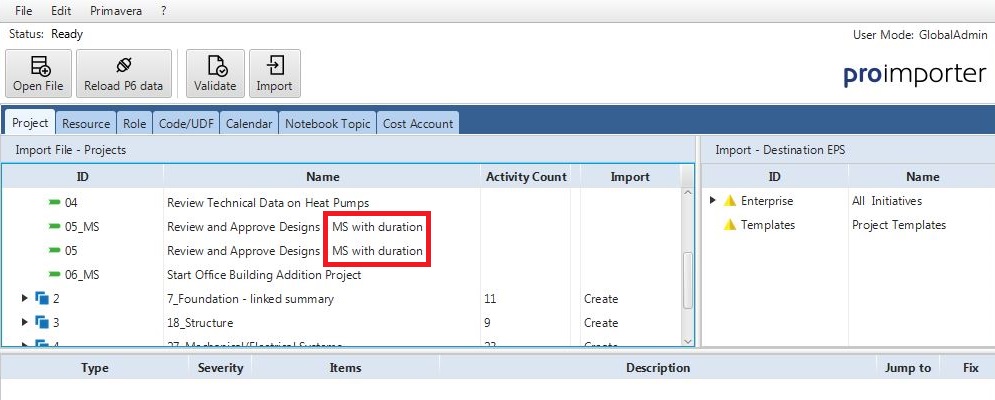
Operate efficiently with our proimporter
In order to solve a recurring task as efficiently as possible under the same conditions, #templates are a popular means. Whether it is the template for the business letter to write invoices or a template that can be used to process the same piece of material identically over and over again.
Also in project management, there are innumerable tasks, which are repeated regularly. These include regular updates that require identical mapping so that all consortium partners receive the same reports each time.
Creating these reports manually from the start is not only inefficient, it also increases the error rate. By using a template individually adapted to your needs, you could save a lot of time and money, minimize the error rate and keep all project participants informed on a regular basis.

The proimporter offers you the possibility of a template function. A once-defined mapping of your objects, like codes, calendars, resources or similar, for regular reuse, ensures that the right parameters are used. If a change of the project structure, e.g. by Change Order, Re-Planning or similar, requires an adaptation of the import template, this is possible at any time.
With the proimporter you minimize your manual time expenditure and guarantee a clean and correct import of your project data into Oracle® Primavera P6 EPPM.
Do you have any suggestions?
You are welcome to send us your suggestions via our contact form. You can also use the chat function on the proimporter website. At regular periods we also offer webcasts for our proimporter. The dates for this can be found on our website or you can follow us on our social media channels.

Assigning prefixes directly before importing with the proimporter
You probably used a project management system like Oracle® Primavera P6 EPPM or Microsoft Project® because you have to coordinate many projects. It is therefore inevitable that many and probably similar projects are created in a project database.
These comparable projects usually have similar structures and data objects, which is the reason why it is helpful to assign a distinctive mark to these objects. Prefixes are especially helpful for this.
Assign custom or flat prefixes to your objects before importing them

With the proimporter you can assign meaningful prefixes before importing the import file to your Oracle® Primavera P6 EPPM. A flat prefix assignment via context menu ensures minimal effort and that all objects in a range are captured. Prefixes can also be used to identify specific project types or individual planning scenarios.
You can assign prefixes for both IDs and object names. If required, an individual assignment of prefixes to individual objects is also possible.
Do you have any suggestions?
You are welcome to send us your suggestions via our contact form. You can also use the chat function on the proimporter website. At regular periods we also offer webcasts for our proimporter. The dates for this can be found on our website or you can follow us on our social media channels.

Always use the right calendar - with no risk at all
Calendars are particularly important for project planning. Globally administered calendars ensure that company-wide working times are taken into account in project planning. A falsification of global calendars can massively falsify the planning of the affected projects - when it comes to contract milestones, this can lead to high penalties in extreme cases.
People have been using calendars for about 6000 years. Whether it is to predict the ideal time for a good harvest, to find a glorious day for the worship of a God, or to plan their own dates and projects in a coordinated way. Since that time, a calendar has been the backbone of any schedule. However, in the past project planners only had to manage their own ideas of time, today they usually need several calendars for different social, societal or cultural aspects.
Planning purely on project-specific calendars, on the other hand, involves the risk that, for example, company holidays, site-specific public holidays, shift times or similar company-specific features of the available working time are incorrectly planned.
No matter which calendar you use, when importing calendars from Microsoft Project® into your Oracle® Primavera P6 EPPM database, you have probably noticed that it is important to select the appropriate calendar for each project. If cross-project planning, for example of key resources or time-distributed cash flow, is to be made, global calendars can make a major contribution to data quality.
With the proimporter, you can clearly analyze the properties of the imported calendar and the calendar to be assigned in the database in corresponding detailed views. This makes it possible to select an exactly fitting calendar and to ensure the quality of the scheduling.
Do you have any suggestions?
You are welcome to send us your suggestions via our contact form. You can also use the chat function on the proimporter website. At regular periods we also offer webcasts for our proimporter. The dates for this can be found on our website or you can follow us on our social media channels.

Clean import of summary tasks and milestones to Oracle® Primavera P6 EPPM
In Oracle® Primavera P6 EPPM there is a strict separation between the Work Breakdown Structure (WBS) and the activities. This separation does not exist in Microsoft Project®. The transition between structural elements and processes is practically fluid.
As a result, Microsoft Project® allows the so-called summary tasks. This means that further activities can be inserted under an activity. The summary tasks can be linked to each other. In Oracle® Primavera P6 EPPM, however, WBS elements cannot be linked with each other.
When importing Microsoft Project® XML-files into Oracle® Primavera P6 EPPM, the following options are available:
On the one hand, it is possible to create WBS summaries for these summary tasks, on which any links are stored. As a disadvantage, links on a WBS summary are not driving. The schedule is therefore potentially changed by the import.
Secondly, Oracle® Primavera P6 EPPM can simply create a flat list of activities instead of a WBS. However, the structure of the project plan is lost during import.
Importing with the proimporter provides you with the following additional options:
In order to obtain driving links, the proimporter in Oracle® Primavera P6 EPPM creates a Task Dependent activity on that the links are stored.
In Oracle® Primavera P6 EPPM, the tool also makes it possible to transfer the links of the summary task to the underlying activities. In this way the Microsoft Project® logic is taken into account that a link on the summary task drives the underlying tasks.
Importing milestones as an activity to Oracle® Primavera P6 EPPM
Unlike Oracle® Primavera P6 EPPM, a milestone in Microsoft Project® can have a duration. When importing directly into Oracle® Primavera P6 EPPM, the user has to decide whether he wants to keep the duration or the information of the milestone.
With the proimporter this need no longer exists. In order to transfer the information "milestone" as well as the information "duration" cleanly from Microsoft Project® to Oracle® Primavera P6 EPPM, the proimporter creates an activity in Oracle® Primavera P6 EPPM with the corresponding duration and the corresponding links. A milestone is attached to this activity, which contains the information that this activity was originally a milestone.
In addition, the ID of the milestone is given the suffix "_MS" and the same identity (number) as the activity itself. At a glance, it can be seen that this milestone belongs to this activity.
Do you have any suggestions?
You are welcome to send us your suggestions via our contact form. You can also use the chat function on the proimporter website. At regular periods we also offer webcasts for our proimporter. The dates for this can be found on our website or you can follow us on our social media channels.

Import automatically MSP files to Oracle® Primavera P6 EPPM with proimporter.
Elapsed Days from MSP only can be imported manually to Oracle® Primavera P6 EPPM, yet. With the proimporter you import Edays cleanly, automatically and without any additional effort.
With the proimporter you simplify your daily work routine significantly.
Logic differences between Microsoft Project® tasks and Oracle® Primavera P6 EPPM activities are always a challenge for the import, because so far Oracle® Primavera P6 EPPM does not consider these or only partly.
Especially with more complicated processes, such as the Hammock Task, a logic bridging is necessary. A Hammock Task is a process that start and end dates are synchronized with the start date of another task and the end date of another subsequent task. In this way, a macro operation spans a certain phase of a schedule, which is to be considered super ordinate, for example, for resource planning or for certain evaluation purposes.
When importing to Oracle® Primavera P6 EPPM, the database now does not recognize these Hammock Tasks from Microsoft Project® as such and the information is lost during the import. The proimporter recognizes the information correctly and imports these tasks as Level of Effort activity to Oracle® Primavera P6 EPPM. Thus, data loss can be avoided and the appointment chain can be imported cleanly.
Elapsed Days are also a regular challenge for project managers. In Microsoft Project® it is possible to ignore the duration of an activity in the stored calendar. This is especially useful for processes that - beyond the normal working day - also take place on weekends (e.g. drying concrete), or for machine availability that can last 24 hours a day. With the proimporter you import these edays directly from the MPP file into Oracle® Primavera P6 EPPM. The tool uses a 24/7 project calendar for this purpose. This ensures that every day is a working day and that the deadlines are correctly met.
If you have any further questions, please do not hesitate to contact us.
Do you have any feedback? You are welcome to send us your suggestions via mail:
At regular periods we also offer webcasts for our proimporter. You can find the schedule in our webcast notifications. Stay up to date. With our release notifications you will always be informed about the latest updates of the proimporter.




